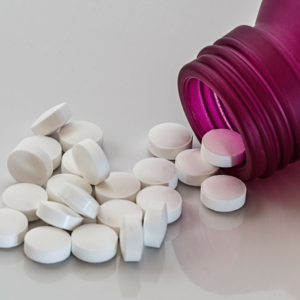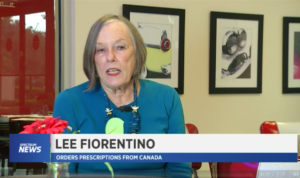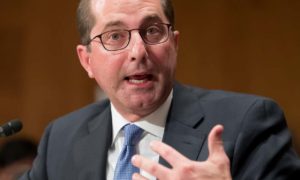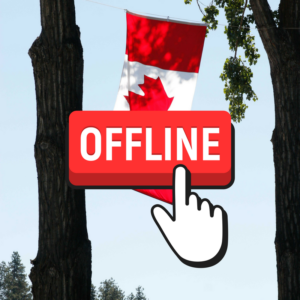by Gabriel Levitt, President, PharmacyChecker.com and Prescription Justice | Aug 9, 2018 | FDA enforcement
 The FDA has made it it’s business to shine a bright light on the evils of illegal fentanyl imports, which are sometimes sold online. That focus seems like it’s a good one. Illegal fentanyl imports get into the hands of drug dealers who use the ingredients to make counterfeit, opioid-based drugs. They sell them to addicts who too often overdose and die. I’ve written a lot about the FDA’s crackdown on illegal fentanyl imports being misused to stop imports of prescription medicines on their way to American patients from Canada and other countries. However, something much more troubling actually has gone down over the past few years.
The FDA has made it it’s business to shine a bright light on the evils of illegal fentanyl imports, which are sometimes sold online. That focus seems like it’s a good one. Illegal fentanyl imports get into the hands of drug dealers who use the ingredients to make counterfeit, opioid-based drugs. They sell them to addicts who too often overdose and die. I’ve written a lot about the FDA’s crackdown on illegal fentanyl imports being misused to stop imports of prescription medicines on their way to American patients from Canada and other countries. However, something much more troubling actually has gone down over the past few years.
According to documents obtained through a Freedom of Information Act request by the John’s Hopkins Bloomberg School of Public Health, the FDA ignored information about off-label prescribing of the most dangerous prescription opioid drugs: fast-acting fentanyl or transmucosal immediate release fentanyl (TIRF). Those drugs were approved to treat the most serious pain experienced by cancer patients. Instead, drug companies encouraged off-label prescribing for patients experiencing lower levels of pain and certainly did not have terminal illnesses.
(more…)
Tagged with: Enforcement, fentanyl, opioids
by Gabriel Levitt, President, PharmacyChecker.com and Prescription Justice | Aug 1, 2018 | Drug Importation
 Here’s a real story about online opioid drug dealers getting indicted and how pharma front groups conflate the opioid crisis with prescription drug importation. I write “real” to juxtapose rogue online pharmacies—that illegally sell addictive drugs—and safe international online pharmacies that don’t sell addictive drugs at all.
Here’s a real story about online opioid drug dealers getting indicted and how pharma front groups conflate the opioid crisis with prescription drug importation. I write “real” to juxtapose rogue online pharmacies—that illegally sell addictive drugs—and safe international online pharmacies that don’t sell addictive drugs at all.
On July 9th, the U.S. Department of Justice for the Southern State of New York announced the indictment of Evelin Bracy and Jorge Rodriguez Lopez for illegal distribution of controlled drugs, including an analog of the opioid pharmaceutical Fentanyl – called U-47700. They are also accused of selling these drugs on the Internet from what the DOJ refers to as a website “purporting to be an online pharmacy.” The indicted parties were also alleged to have sold drugs under pharmaceutical names, oxycodone and alprazolam, that were found to have other ingredients, implying that the products were counterfeit. These counts can technically land a person in jail for 40 years.
If the allegations are true, then we’re dealing with bona fide drug pushers. The Partnership for Safe Medicines (PSM), a Pharma-funded non-profit group that seeks to conflate such drug dealing and counterfeiting with pharmacies in other countries that sell affordable prescription medicines to people here in the U.S. PSM is keeping a web diary of law enforcement busts that help stop the deadly fentanyl trade, which is taking the lives of thousands of Americans each year. We applaud law enforcement for disrupting these opioid dealing operations and bringing their orchestrators to justice.
(more…)
Tagged with: Enforcement, opioids
by Gabriel Levitt, President, PharmacyChecker.com and Prescription Justice | Jul 31, 2018 | Internet Censorship

The pharmaceutical industry, generally, does not like our company. As an extension of that feeling, the FDA doesn’t love us either. Basically, we are in Big Pharma’s crosshairs because the information we provide helps people find more affordable medicines from other countries and import it for personal use.
But is that a reason for Instagram to shutdown our account!? That action is nothing less than corporate-inspired, government-encouraged censorship. Mike Masnick of TechDirt refers to this as the soft underbelly of Internet censorship. Also, please read this background from the Electronic Frontier Foundation calling out Big Pharma on this issue.
Congress and the FDA are banging on the door of Facebook, Google, Instagram, etc. about stopping people from selling opioids on their platforms. We can debate until the cows come home about what content should be self-censored — meaning removed without a court order — but please hear me out on why Instagram’s dissing PharmacyChecker doesn’t even come close to acceptable and let us know if you agree or disagree.
First of all, PharmacyChecker.com does not sell or facilitate the sale of medication. Medications are not purchased on our site and we have no role in the processing of prescription orders. We verify credentials and publish information about online pharmacies and drug prices. That information is globally accessible on the Internet.
By the way, our Verification Program bans online pharmacies that ship controlled drugs of any kind into the U.S. This includes not only prescription opioids, but also Valium, Xanax, and Adderall. We’re with the DEA on strict controls and highly attuned to and concerned about the opioid crisis. I have friends who view our policy as too conservative. You get the picture.
We agree with cracking down against dealers of opioids, with Fentanyl being the greatest concern. On the other hand, we have seen Pharma and the government use a crackdown against addictive prescription drug sales online to veer into a crackdown against imports from Canada of decidedly regular meds that treat asthma, diabetes, depression, high cholesterol and blood pressure, etc.
We launched PharmacyChecker in 2003 to help people searching the Internet for lower medicine prices from real pharmacies, domestic and international. Our verification program is run by a licensed PharmD from Massachusetts, Dr. Shivam Patel. Pharmacies listed in our program must require valid prescriptions, sell only personal-use quantities, have a pharmacy license, and cannot sell controlled drugs of any kind internationally, into the U.S.
Feel free to read about our extensive protocols for verifying international online pharmacies.
In 2012, I was asked to write a chapter in a book called Hacking Politics, which is now published as an anthology about the battle to kill the Stop Online Piracy Act. My chapter was called the “Online Pharmacy Story.” In short, due to lobbying by the pharmaceutical industry, SOPA contained language that would have potentially made PharmacyChecker.com illegal at a maximum; at minimum, it would have increased our intermediary liability exposure. I strongly opposed it. And yet we see big industries moving SOPA by a thousand cuts.
I believe there’s some chance that Instagram dissed our account accidentally, based on a sweep of sites having to do with drugs, medicines, pharmacies, etc. But there’s also a small chance that Pharma’s influence led to the direct shutdown of our account as a slap in the face to PharmacyChecker advocacy efforts. I’m constantly criticizing Pharma’s propaganda about importation and online pharmacies our blog, in the New York Times, RightsCon, and directly to members of Congress in my testimony.
In fact, last year I caught PhRMA, meaning the big pharma trade association, placing Google ads using our name to dissuade people against importation of lower-cost medicines. As I wrote in our blog, that was a badge of honor but kind of disconcerting as well.
Late last month, the FDA called Instagram, Google, Reddit, and many others, to what was called the FDA Opioid Online Summit. I blogged about it beforehand mostly to note that groups funded by Pharma were well represented, ones that focus on opposing importation of lower-cost medicines and use the opioid crisis for that goal. Initially, the summit was billed as a public event, but it turns out that journalists were locked out and those that covered the public part did conclude that opioids were not the sole target, but cheaper meds were open season, too.
We want our Instagram account reinstated on principle, yet no one has responded to our multiple attempts at contacting Instagram’s customer support.
Anyone willing to weigh in on this?
Tagged with: Instagram, opioids, Stop Online Piracy Act
by Gabriel Levitt, President, PharmacyChecker.com and Prescription Justice | Jul 26, 2018 | FDA enforcement

Click here to watch Lee tell her story
This week I’m highlighting a troubling local news story from earlier this month about the FDA seizing medicine imports from patients. Imports of medicines for personal use are under most circumstances prohibited under federal law, but millions have relied on the international pharmacy option for years. In fact, most medicines that Americans import to save money reach their destination. Recently, it seems there is a slight uptick in seizures, one that may be a casualty in the battle to stop dangerous opioid drugs. Or, like drug companies, the FDA is using the opioid crisis as a pretext to crack down on safe personal drug importation.
The report, on Spectrum News 13, comes out of Central Florida where hundreds of customers of The Canadian Medstore, a pharmacy assistance office, have said that the FDA has taken and held medicine imports shipped by mail. The FDA has received $94 million in additional funding to address the opioid crisis, including stopping illegal imports of opioid drugs, most prominently Fentanyl, which is known to be illegally imported from China. However, according to the Spectrum News report, the imports that the FDA is refusing are for regular medicines that treat maintenance conditions such as asthma, high blood pressure, and high cholesterol. The Canadian Medstore states that it does not sell prescription opioids or controlled substances of any kind.
This company was the subject of an FDA raid last fall, one that seemed overzealous if not unwarranted, which I blogged about here. It appears that as part of an investigation, imported medicines were seized and tested by the FDA at the time. According to the FDA, the medicines contained the correct active ingredients in the correct amounts.
Members of Congress Defend Safe Personal Drug Importation
Senator Bill Nelson (D-FL) has written to the FDA to express his concern about what appears to be a more aggressive stance by the agency against people buying more affordable medicine internationally. Other lawmakers who have sent other letters of concern include Representatives Kathy Castor (D-FL) and Gus Bilirakis (R-FL). Senators Amy Klobuchar (D-MN) and Chuck Grassley (R-IA) have also sent a letter asking the FDA if they have changed the personal drug importation policy.
Patient Asks Why?
Lee Fiorentino, 72, suffers from asthma and COPD. She was interviewed as part of the Spectrum News report because her asthma medication was detained by the FDA. The reporter did an online price search on GoodRx for Ms. Fiorentina’s medicine and the cost was $338/month in the U.S., which is over six times higher than the $52/month she pays purchasing them internationally.
Ms. Fiorentino says: “I don’t understand why [the FDA] would want my asthma medication. It just seems like a strange thing to do.”
Indeed.
Tagged with: Bill Hepscher, Enforcement, Florida, imports
by Gabriel Levitt, President, PharmacyChecker.com and Prescription Justice | Jul 20, 2018 | Drug Importation

Azar is proposing a discussion about allowing imports of single-source drugs to lower costs
Yesterday, Health and Human Services Secretary Alex Azar announced that he was tasking FDA Commissioner Scott Gottlieb with forming a working group to explore how drug importation could be used to lower prices. See Gottlieb’s remarks on the proposal.
The crux of the proposal is very narrow. Azar is considering allowing imports of foreign versions of off-patent medicines that only one manufacturer (also referred to as “single-source” drugs) is selling in the U.S. market. That would be a drug without any competition where the company with the marketing license jacks the price. Keep in mind that he has simply called for a working group to discuss it.
I’m getting asked a lot of questions about this proposal and realize that many people, including well-informed journalists and policy professionals, don’t really get this.
People who already import medicines, through buying them online or carrying them home from Canada to save money may also be confused!
So, to help any and all understand what HHS and the FDA are considering when it comes to drug importation, below are some important takeaways. My general take, as noted in the Washington Post, is that it’s a step in the right direction (if it goes forward), and it could help educate the public about greater potential benefits to larger scale importation.
- This is not legalizing buying cheaper, FDA-approved meds from retail pharmacies in Canada online or otherwise.
- Millions of Americans already benefit from importing lower-cost, safe and effective medicines for personal use. They do this despite the existing federal prohibitions and scare tactics employed by industry-funded groups to deter such purchases. To do so safely, they stick to credentialed online pharmacies, such as those verified by PharmacyChecker.com. Today, Roger Bate, who is affiliated with the American Enterprise Institute, wrote: “All the FDA has to do is allow Pharmacy Checker to do its job and tell the American people about it.”
(more…)
Tagged with: Alex Azar, politics, Roger Bate, Scott Gottlieb
by Gabriel Levitt, President, PharmacyChecker.com and Prescription Justice | Jul 19, 2018 | FDA enforcement
 The online pharmacy, CanadaDrugCenter.com, which had been verified by PharmacyChecker, is no longer accessible over the Internet. At the end of June, the managers of the online pharmacy—and others owned by them, CanadaDrugPharmacy.com and CanadaDrugStop.com—informed PharmacyChecker that they were withdrawing from the PharmacyChecker Verification Program because they were going offline, but they did not tell us why.
The online pharmacy, CanadaDrugCenter.com, which had been verified by PharmacyChecker, is no longer accessible over the Internet. At the end of June, the managers of the online pharmacy—and others owned by them, CanadaDrugPharmacy.com and CanadaDrugStop.com—informed PharmacyChecker that they were withdrawing from the PharmacyChecker Verification Program because they were going offline, but they did not tell us why.
We still don’t know why, either, but I suspect it has to do with the U.S. government’s case against its owners dating back to 2007-2011.
(more…)
Tagged with: canadadrugcenter, canadadrugs, Enforcement
 The FDA has made it it’s business to shine a bright light on the evils of illegal fentanyl imports, which are sometimes sold online. That focus seems like it’s a good one. Illegal fentanyl imports get into the hands of drug dealers who use the ingredients to make counterfeit, opioid-based drugs. They sell them to addicts who too often overdose and die. I’ve written a lot about the FDA’s crackdown on illegal fentanyl imports being misused to stop imports of prescription medicines on their way to American patients from Canada and other countries. However, something much more troubling actually has gone down over the past few years.
The FDA has made it it’s business to shine a bright light on the evils of illegal fentanyl imports, which are sometimes sold online. That focus seems like it’s a good one. Illegal fentanyl imports get into the hands of drug dealers who use the ingredients to make counterfeit, opioid-based drugs. They sell them to addicts who too often overdose and die. I’ve written a lot about the FDA’s crackdown on illegal fentanyl imports being misused to stop imports of prescription medicines on their way to American patients from Canada and other countries. However, something much more troubling actually has gone down over the past few years.

 Here’s a real story about online opioid drug dealers getting indicted and how pharma front groups conflate the opioid crisis with prescription drug importation. I write “real” to juxtapose rogue online pharmacies—that illegally sell addictive drugs—and safe international online pharmacies that don’t sell addictive drugs at all.
Here’s a real story about online opioid drug dealers getting indicted and how pharma front groups conflate the opioid crisis with prescription drug importation. I write “real” to juxtapose rogue online pharmacies—that illegally sell addictive drugs—and safe international online pharmacies that don’t sell addictive drugs at all.


 The online pharmacy, CanadaDrugCenter.com, which had been verified by PharmacyChecker, is no longer accessible over the Internet. At the end of June, the managers of the online pharmacy—and others owned by them, CanadaDrugPharmacy.com and CanadaDrugStop.com—informed PharmacyChecker that they were withdrawing from the PharmacyChecker Verification Program because they were going offline, but they did not tell us why.
The online pharmacy, CanadaDrugCenter.com, which had been verified by PharmacyChecker, is no longer accessible over the Internet. At the end of June, the managers of the online pharmacy—and others owned by them, CanadaDrugPharmacy.com and CanadaDrugStop.com—informed PharmacyChecker that they were withdrawing from the PharmacyChecker Verification Program because they were going offline, but they did not tell us why.